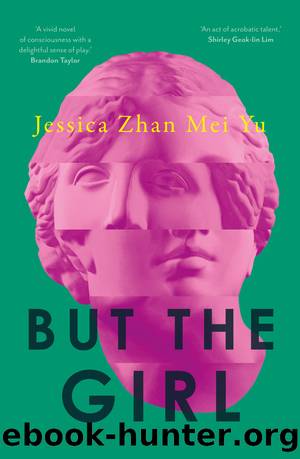But the Girl by Jessica Zhan Mei Yu

Author:Jessica Zhan Mei Yu [Jessica Zhan Mei Yu]
Language: eng
Format: epub
ISBN: 9781760146054
Publisher: Penguin Random House Australia
Chapter Nine
I woke up improbably early in the morning the next day. It was still dark when I sat at my desk and read over what I had written of Pillar of Salt. When I read what I had so proudly written just fifteen hours or so before, I felt so ashamed. How had I thought that memories and pastness and myself would be all that a novel needed to be? I was bad at writing Malaysia â everything I wrote sounded like it had come straight from Lonely Planet even though my family and I had come from there.
I put my face in my hands and pretended to disappear so I could have some reprieve from myself.
Whenever I felt bad about my novel, I pivoted to my dissertation (and vice versa really) so I opened the online catalogue of my universityâs library on my laptop.
I borrowed the e-book of Plathâs unabridged journals. I began reading from the start and then I got to the famous quote from Plathâs time while she was at Smith: âAnd I sit here without identity: faceless.â
I thought about how Plath had been lost without any sense of clear identity and how the opposite had been true for me. I was overburdened by the overdetermining of my identity. And âfacelessâ: no immigrant in the West has ever thought of themselves as faceless because that would be to think of oneself as raceless. And, as Ma had always made clear to me: the face is a metonym for oneâs race. The Chinese face, with its physical markers â eyes, nose, mouth, cheeks, chin, hair â confirmed to those who looked at me that race was physically inscribed upon the body. The markers argued against the idea that race was merely a construct created alongside racism itself. The markers said, Hello I am indelibly me, an identity I cannot shed. There is no blank canvas for the person of colour. And yet this was all about how the white gaze saw me. What about how I saw it?
The word faceless made me think of the Chinese idea of losing face, of having no face at all and, conversely, of having face, saving face. âFaceâ as a metonym for oneâs dignity, pride, social standing â for your ability to face the world without lowering your gaze to your shoes. Losing face was in some ways the worst possible thing that could happen to a person. It made me think of âThe Love Song of Alfred J. Prufrockâ. It made me think of a person peeling their face off their skull so all that remained was a gluggy mess of blood and bone and brain. It was a difficult thing to articulate even to myself because despite the way âfaceâ referred to outward appearances and, in some ways, superficial markers of success or happiness, the idea of face sat so far beneath the surface that it felt invisible to me. It was part of the cultureâs preconscious, it lived where our worst fears and pettiest resentments and most painful memories live.
Download
This site does not store any files on its server. We only index and link to content provided by other sites. Please contact the content providers to delete copyright contents if any and email us, we'll remove relevant links or contents immediately.
In Control (The City Series) by Crystal Serowka(35378)
The Wolf Sea (The Oathsworn Series, Book 2) by Low Robert(33871)
We Ride Upon Sticks by Quan Barry(33307)
Crowbone (The Oathsworn Series, Book 5) by Low Robert(32353)
The Book of Dreams (Saxon Series) by Severin Tim(32258)
The Daughters of Foxcote Manor by Eve Chase(22306)
Trainspotting by Irvine Welsh(20085)
Call Me by Your Name by André Aciman(18991)
Shot Through The Heart (Supernature Book 1) by Edwin James(17935)
The Secret History by Donna Tartt(16664)
The Girl from the Opera House by Nancy Carson(14997)
Sad Girls by Lang Leav(13363)
American King (New Camelot #3) by Sierra Simone(13003)
Pimp by Iceberg Slim(12947)
All the Missing Girls by Megan Miranda(12775)
The Betrayed by Graham Heather(11715)
The Betrayed by David Hosp(11682)
4 3 2 1: A Novel by Paul Auster(11076)
Still Me by Jojo Moyes(9918)
